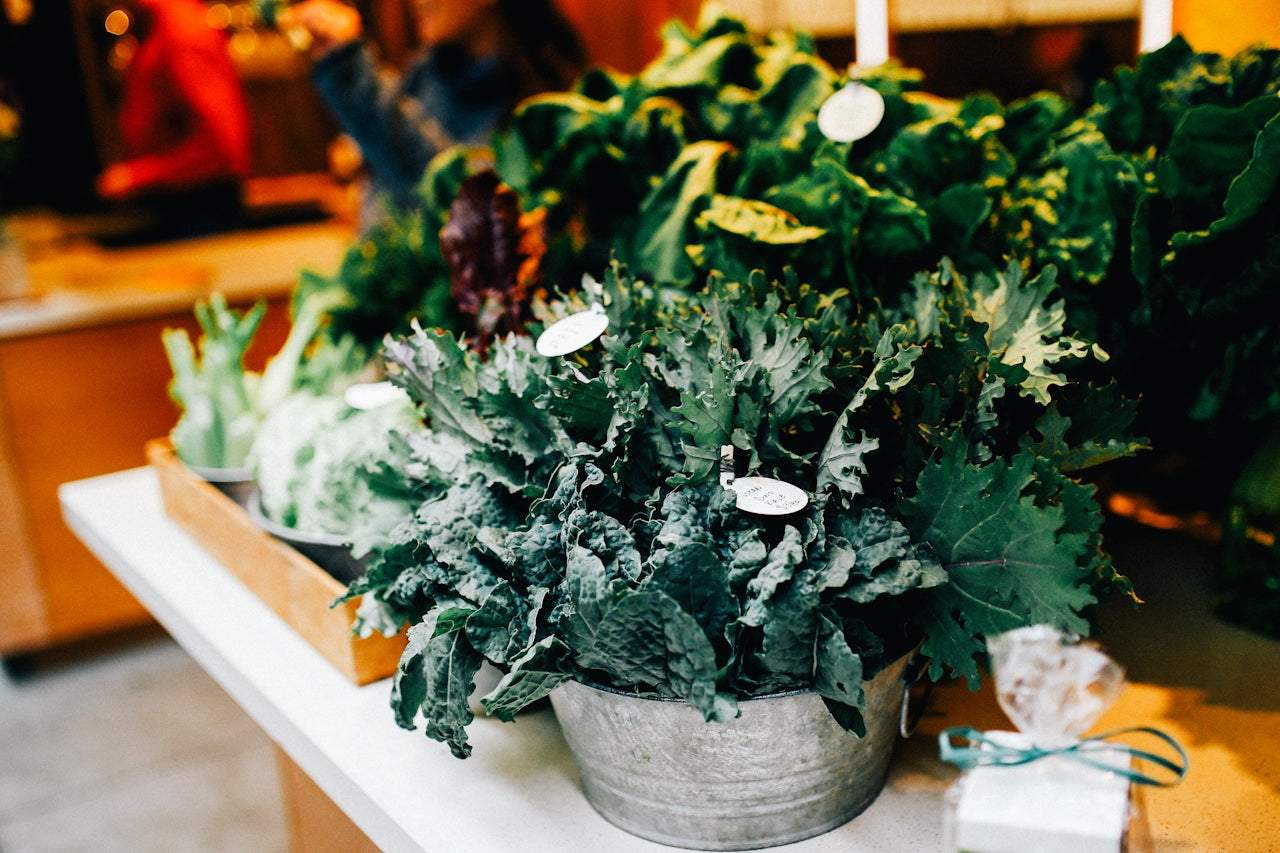

· By Maggie Morton
Health Benefits of Kale
Kale is more than just a trendy superfood; it’s a leafy green powerhouse packed with nutrients that make it a great addition to your diet. Whether you're tossing it into a salad, blending it in smoothies, or sprinkling it on your meals (hello, Edggies!), kale offers impressive benefits for your health. Let’s dive into why kale deserves a spot on your plate.
Why Kale is a Nutritional Superstar
Kale belongs to the cruciferous vegetable family, alongside broccoli and Brussels sprouts, and is loaded with essential nutrients. A single cup of cooked kale provides:
- Vitamin K: 544 mcg (over 600% of your daily requirement)
- Vitamin C: 91 mg (more than an orange!)
- Calcium: 354 mg (great for non-dairy diets)
- Fiber: 5.7 g (hello, gut health!)
- Antioxidants: Lutein, zeaxanthin, and beta-carotene
These nutrients contribute to better digestion, heart health, stronger bones, and glowing skin.
Kale and Gut Health: A Win-Win
Fiber in kale helps keep your digestive system humming along. It promotes regularity, prevents constipation, and nourishes good gut bacteria. Kale also contains prebiotics, which feed beneficial gut microbes and support a diverse microbiome—a key factor in overall health.
Pro tip: Massage raw kale leaves with a little olive oil to make them easier to digest or steam them lightly to maximize nutrients.
Debunking Myths: Are Oxalates in Kale a Problem?
Kale contains oxalates, compounds found in many plants, which can bind to calcium and reduce its absorption. However, the levels in kale are much lower compared to spinach, making its calcium more bioavailable. Unless you’re prone to kidney stones or consuming kale in massive quantities, you’re good to go.
Top Health Benefits of Kale
1. Supports Heart Health
Kale is rich in potassium, fiber, and antioxidants, all of which help reduce blood pressure and lower LDL cholesterol levels.
2. Boosts Eye Health
Thanks to lutein and zeaxanthin, kale protects against age-related macular degeneration and improves vision.
3. Strengthens Bones
With high levels of calcium and vitamin K, kale supports bone density and reduces the risk of fractures.
4. Fights Inflammation
Kale’s antioxidants, including quercetin and kaempferol, help reduce inflammation, a major factor in chronic diseases.
5. Enhances Skin and Hair
Beta-carotene (a precursor to vitamin A) and vitamin C in kale promote collagen production for healthy skin and shiny hair.
FAQs About Kale
Q: Is it okay to eat kale every day?
A: Yes, kale is safe to eat daily in moderate amounts. However, vary your greens to ensure a balanced nutrient intake.
Q: What’s the healthiest way to eat kale?
A: Steaming kale preserves its nutrients, but raw kale in salads or smoothies works too. Massage it to reduce bitterness and improve digestion.
Q: Is kale better for you than spinach?
A: Both are nutrient-dense, but kale has more vitamin C and calcium. Spinach has more iron, so the best choice depends on your needs.
FAQs About Edggies Veggies
Q: What are Edggies?
A: Edggies are air-dried kale sprinkles that add nutrients to your meals without changing the flavor. Think of them as your veggie cheat code!
Q: How can I use Edggies?
A: Sprinkle them on pasta, soups, eggs, or even add them to a batch of brownies. They’re a super easy way to boost your veggie intake.
Q: Are Edggies safe for people with dietary restrictions?
A: Yes! Edggies are vegan, gluten-free, and made from just air-dried kale, making them suitable for most diets.
How to Add More Kale (and Edggies) to Your Diet
- Smoothies: Blend kale with fruit, yogurt, and a splash of almond milk.
- Chips: Bake kale leaves with olive oil and a pinch of salt.
- Sprinkles: Use Edggies to sneak kale into pizza, popcorn, or even dessert.
Kale and its creative variations like Edggies are proof that eating healthy doesn’t have to be boring. So go ahead, give this green giant a try and see how it transforms your meals and your health! 🌱
